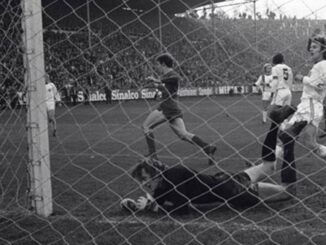
The Wankdorfstadion, Bern, Switzerland. Germany, still in the midst of recovery in the aftermath of the Second World War, lined-up in the 1954 World Cup final opposite what was the footballing powerhouse of the day, Hungary’s Golden Team; the Mighty Magyar’s.
It was Germany’s Vertragsspieler against Hungary’s full-time professionals.
What transpired over 90-minutes in front of 62,500 spectators would eventually come to be called Das Wunder von Bern, with Germany storming back from an early two-goal deficit to lift the nations’ first-ever Jules Rimet Trophy.
Victory over a Hungarian-side that had not tasted defeat in four years (over thirty matches played) not only kickstarted Germany on to economic, political, and sporting progression, but caused a reversal of fortunes for a nation in Hungary that would never again reach the same heights in the sport.
Brilliant players such as Ferenc Puskás, Sándor Kocsis, József Bozsik, and Zoltán Czibor, who at the time were at the tip of the footballing spear in Europe, would never again achieve national greatness. Puskás would go on to Real Madrid CF, while Kocsis and Czibor would also land in Spain, heading to FC Barcelona.
But this is not a tale of Hungarian yesteryear, but rather the influence of one club in particular. One club that played a vital role in lighting a footballing fire under an entire nation; 1.Fußball-Club Kaiserslautern e.V.
German champions in 1951 and 1953, die Roten Teufel players formed the nucleus of the nations triumph in ’54. The legendary Fritz Walter (captain), his younger brother Ottmar Walter, Horst Eckel (the only player to feature that day still living), Werner Kohlmeyer, and Werner Liebrich, were all in Sepp Herberger’s XI.
Though Eckel hails from the small town of Vogelbach, the brothers Walter, Kohlmeyer, and Liebrich were all Kaiserslautern-natives. Their impact on football not only extended to their international success in 1954, but 1FCK in immeasurable ways.
When their careers all came to an end, four of the Red Devils (data is unavailable for Kohlmeyer) logged 1146 club appearances and amassed 741 goals, though 682 of those goals were courtesy of Fritz and Ottmar.
Perhaps ominously, however, Kaiserslautern-influenced success for Germany did not translate to club level. Though 1951 and 1953 were years where 1FCK were successful on the pitch, just weeks before the 1954 World Cup saw Kaiserslautern thrashed 5-1 against Hannover 96 in the German Championship final.
Despite winning the Oberliga Südwest, which led to their qualification to the championship tournament, their performance in the final left a dark cloud looming above the Betzenberg. Similar fate befell the club a year later in 1955, suffering defeat in the German Championship final yet again; this time, a 4-3 loss at the hands of Rott-Weiss Essen.
In the aftermath of their 1953 triumph, despite their sons’ World Cup heroics in Switzerland, 1FCK would not lift a trophy – league or cup – until their DFB-Pokal win during the 1989-90 campaign. Though the club reached a number of cup finals from 1960-80, a substantial barren patch plagued one of Germany’s most-famous teams.
Pokal success was soon followed by Bundesliga triumph in 1990, along with top-five league finishes in three of the following four seasons. While another Pokal win would follow in 1995-96, so too did relegation.
A quick return to the German top-flight would ensue, however, after Kaiserslautern topped the 2.Bundesliga table. What happened afterwards would be another historic feather in their cap.
Under the stewardship of former Bayern Munich manager Otto Rehhagel – who was sacked by the Bavarian giants the previous year – Kaiserslautern became the first and only newly-promoted club to lift the Bundesliga trophy.
Rehhagel managed a side that featured the likes of the aged-yet-great Andreas Brehme, Olaf Marschall, and Czech stalwarts Miroslav Kadlec & Pavel Kuka. Together with notable Bulgarian international Marian Hristov, Swiss midfielder Ciriaco Sforza, and a young prodigious talent by the name of Michael Ballack, 1FCK wrote their name into the history books once more.
It would be the last time the Rheinland-Palatinate would enjoy any notable footballing success.
What would follow was a period of down, then up, and then back down again; relegation in 2005-06, redemption in 2019-10, and then failure to avoid the drop again in 2011-12. This would be the last time one of Germany’s most successful clubs would ever grace the Bundesliga.
Kaiserslautern would remain in the 2.Bundesliga for six years, including three seasons where top three and four finishes would get them close to a return, but not close enough. At the completion of the 2017-18 season, and with an 18th-place finish in the table, Kaiserslautern were relegated to the 3.Liga for the first time in it’s history. The death warrant of the club was all but assured.
When Germany hosted the 2006 World Cup, Kaiserslautern was chosen as one of the ten host venues. As a small city in a historically financially modest region, this was first viewed as a potential boon to the local economy. While most cities that were chosen as venues benefitted in the long term, Kaiserslautern could not boast the same.
Due to being chosen as a host, the Fritz-Walter-Stadion underwent major renovations from 2002-05, which also included expanding the grounds capacity from 38,500, to 49,850.
Initially, this was not an issue, provided the club remained in the top-flight of German football. But when they failed to avoid relegation in the 2005-06 campaign, the stadium expenses reared their ugly head. In conjunction with relegation, promotion, and then relegation again over the course of six seasons, 1FCK spent considerably over their financial means in a bid to quickly get back into the league, and stay there.
The result would be multiple instances of stadium rent restructuring by the club with the local government. But as club revenue decreased, along with a failure at board level to keep spending sustainable, relegation to the 3.Liga sapped the club of any cash reserves that were left to keep it afloat.
Though rumoured outside investment in 2018 was linked with interest in not only the club, but area development around the Fritz-Walter and in the Rheinland-Palatinate at large, it never materialised.
Debts of up to 20-million euros have been touted, and no way to cover enough without investors. Unfortunately, Kaiserslautern had to file for bankruptcy and were declared insolvent. The club, however, are one of a reported host of German clubs who have suffered financially in the wake of the Covid-19 pandemic, including 13 of the 36 combined teams in the Bundesliga and 2.Bundesliga.
At current, there is no telling what the future holds for the Pfälzerwald-club, but certainly, there is a risk that their historic footprint could fall by the wayside.
So why would an American from New York City choose to pay homage to a club that most of my countrymen and women have never heard of? I have a childhood friend to thank for that.
Growing up in the Riverdale section of the Bronx, a neighborhood firmly rooted with a German and Eastern European community, my childhood best friend was a first-generation American of German descent.
When I began playing football at the age of six, Robbie and I both started together at youth level. Though I would go on to play to a relatively high level, Robbie stopped when he was much younger. Despite that, it was his Opa that played a huge role in fostering my love of the game at a young age.
Opa was a massive Kaiserslautern supporter. And though his life was placed into unparalleled upheaval – which included being sent to concentration camps during the Second World War – football was always a constant for him.
He was lucky enough to see Fritz Walter and co. play, live, and in color. Despite my first football top being a Bayern jersey (it was a gift), he would always show great respect for them. But nothing made his face light up more than talking about Lautern.
As I heard and read news of 1FCK’s constant financial struggles, and consequently their filing for bankruptcy, it was a tough pill for me to swallow. Without them, it can certainly be postulated that Germany would have never propelled itself into the fold as one of the worlds greatest footballing institutions, let alone manufacture economic and social rebirth from the ashes of conflict.
So, to all those who live and breathe Kaiserslautern, and who have experienced the ground that bears the name of the cities most-famous son; here’s hoping lady luck shines bright on top of the Betze. Football – and Germany – would not be the same without you.
Schlaf gut und süße Träume, Opa…



